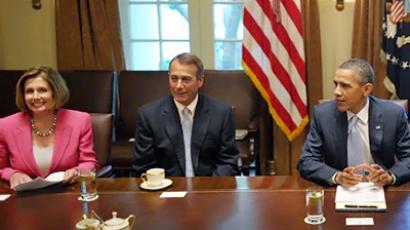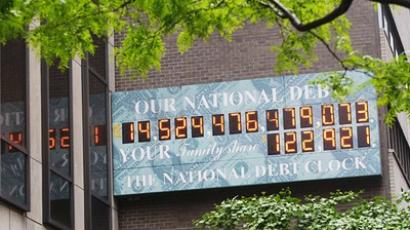US Senate blocks Democrats’ debt plan
In Sunday’s session in the Senate the Democrats’ debt plan - which included $ 2.2 trillion in spending cuts - fell just ten votes short of being approved as a possible means of dealing with the country’s tottering finances.
The plan, which had been put forward by Senate Majority Leader Harry Reid, gained 50 votes for but was opposed by 49 voters. To go through the legislative body, the bill needed the approval of 60 members out of 100. The Senate will have to agree on a new program with the August 2 deadline looming. Though the debt ceiling proposed by the Democrats failed to gain approval, some major points of their program are still expected to surface in the bipartisan deal some hours later, reports Reuters. Senate Majority Leader Reid told the lawmakers not to wander too far from the Capitol in case he calls another vote.“The arrangement that is being worked on with the Republican leader and the administration and others is not there yet," Reid said after the vote, as quoted by Reuters. Thus, the effort to reach a bipartisan deal goes on.On Sunday morning senators cautiously discussed Saturday's progress with the final deal between Republicans and Democrats. "We're very close," Senate minority leader Mitch McConnell said on Sunday, as cited by Reuters. The top Senate Republican, who is playing a key role in the debt ceiling negotiations, added the two sides “made dramatic progress” on Saturday.Asked if a deal with Democrats would emerge on Sunday, McConnell said, "soon." “There is no final agreement,” said Senator Charles Schumer, who is a member of the Democratic leadership. But there is a sense of relief that the two sides were finally working on a compromise plan, he added as cited by the Associated Press.One of the last sticking points, according to Senator Schummer, is the creation of a “trigger” mechanism, which that would hit the priorities of both parties should the committee fail to come up with a joint plan. The pool of “trigger” ideas included automatically reducing spending on such programs as Medicare or reducing defense and non-defense programs by an equal amount.The information comes shortly before the deadline of August 2, when many feared the country would announce a default.An agreement on increasing the nation’s 14.3 trillion dollar debt ceiling would mean increased borrowing until after the next presidential election. As an unnamed source familiar with the talks told Bloomberg last night, the White House and congressional Republicans have already sketched out the contours of such an agreement.This framework would include immediate spending cuts of one trillion dollars, as well as the creation of a committee to work out ways to make additional savings of up to 1.8 trillion dollars later this year. The Congress would have to approve the new panel’s recommendations by late December. Otherwise, government departments and programs, including defense and Medicare, would face automatic cuts.On Friday, a proposal to raise the debt-ceiling was passed in the Republican-dominated House of Representatives, but the Democrat-controlled Senate killed it hours later.The US Capitol has remained in deadlock as they try to avoid a default, ahead of Tuesday's deadline.














